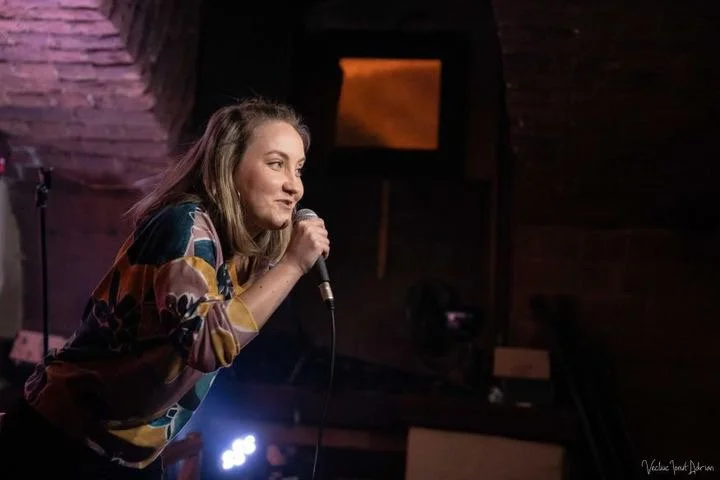Therapy Through Art, Creation and Performance: Plymouth’s Comedy Scene and the Connection Through Community
By Will Skillington
Emerging from a two-year long dense fog of severe depression, I find myself reflecting deeply on the role of creativity and community in healing. During my illness I never thought I would perform again. And I almost didn't make it.
During this period I was diagnosed with bipolar disorder and ADHD, which in hindsight makes complete sense. I now have a better understanding of how my mind operates—and how essential art, performance, and connection have been not only for my recovery but for, excuse the new age terminology, maintaining some kind of spiritual homeostasis. The Plymouth comedy scene is a factor in this.
My name is Will Skillington - A Learning Disability nurse, comedian, musician (As Strange Billy the Saint), promoter (A Press of Suspects {presents}), father, husband, brother, uncle, son and human being. That sounds like a lot of hats to wear, and it is. But those hats keep me warm. They remind me of who I am. And perhaps most importantly, they help me stay here—present, grounded, connected. It's what saved me in my darkest, darkest moments
Comedy is often seen as entertainment—and of course it is. It makes us laugh, distracts us from the chaos outside (and inside), and gives us something to look forward to. It could be argued that sometimes something deeper is happening. Comedy can be therapeutic. It can be a lifeline. It’s a wild, joyful act of resistance against isolation, shame, and the numbing grind of modern life.
Cristina Varga
In Plymouth we have Underground Laughs at The Underground in Mutley, run by the ridiculously passionate and tireless Cristina Varga and Oli Cordova. There's a loyal, kind audience and it's a great night to try new stuff. I played one of my 1st sets there after emerging from my darkness. It was lush. That room wants you to win. In a world that so often doesn’t, that means everything.
Then there’s The Fortescue on Mutley Plain, hosted by the anarchically brilliant Robin Marsipan. Robin’s nights are chaotic in the best possible way—beautifully loose, unpredictable, real. They strip away the gloss and reveal comedy in its raw, beating-heart form. Performers chat between sets like old friends. The crowd gives back what you give them. You feel seen, even when you’re dying onstage. Especially then.
The Bread and Roses in the city centre, hosted by the soulful and supportive Ben Treloar, offers yet another version of community. Ben curates a space where political, personal, and downright bizarre comedy can co-exist. It's a safe space, not in the mollycoddling sense, but in the way that it holds you—lets you explore your edges without fear of being thrown out for showing your scars. There’s something revolutionary in that.
I also have to mention Sally Claire's wondrous Filth nights - a beautiful mix of burlesque, comedy, music, drag, performance art and everything in between - It’s more than an open mic; it’s an incubator for misfits and miracle-makers. LGTBQIA+ friendly/encouraged, I had an absolute blast performing there and I am a boring middle aged heterosexual white cis male . Filth is a place where awkwardness/alternative lifestyles are art - vulnerability is celebrated, not ashamed.
These places aren’t just gigs—they’re rituals. For audience members, they offer relief from loneliness, a chance to belong, to laugh, to feel. For comedians, they’re vital. I’ve tested half-formed thoughts, stumbled over words, and still been met with applause/acceptance.
David Arnold
We’re lucky in Plymouth to have legends who’ve built and nurtured this scene. Suzy Bennett, with her razor-sharp wit and huge heart, blazed a trail for so many of us. Watching Suzy perform is like getting a masterclass in authenticity. David Arnold, with his boundless energy and clever wordplay proves that intelligence and silliness can share a stage beautifully. Christian Russell-Pollock has carved out a unique voice in British comedy, one that blends sincerity and satire with surgical precision. Jane Hill brings honesty and empathy to her work—always sharp, always human.
These comedians are not just funny—they’re vulnerable, resilient, generous. They show up. And their work creates a permission structure for others—like me—to do the same.
Living with bipolar disorder has meant I have had long periods of hypomania and utter despair. ADHD adds an unpredictable chaos to everything. But performing gives me a container for it all. Comedy is where I make sense of the noise. Where I transform shame into connection. Where I turn manic thoughts into punchlines, depressive spirals into observational riffs. Creating—whether it’s music, jokes, or a show about Owls featuring my kids - keeps me stable, connected and present. Sharing this with a receptive audience is delicious.
We don’t talk enough about how creativity saves lives. We don’t talk enough about how these small, local comedy nights are actually massive acts of mental health support. No NHS referral. No waiting list. Just a mic (maybe a loop pedal in my case), a stage, and people who care.
So, here’s my message to anyone struggling - comedian, audience member, or both: Come. Sit in the dark with us. Laugh until your face hurts. Get up and tell your story, even if your voice shakes. This scene will catch you.
In Plymouth, we’re doing more than telling jokes. We’re building something sacred. Something that matters. We’re proving that community, creativity, and connection can keep us going—one gig at a time.
WS




